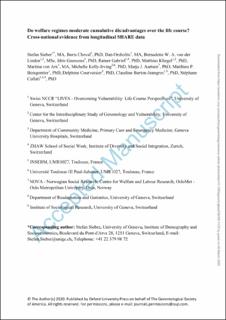Please use this identifier to cite or link to this item:
https://doi.org/10.21256/zhaw-19904| Publication type: | Article in scientific journal |
| Type of review: | Peer review (publication) |
| Title: | Do welfare regimes moderate cumulative dis/advantages over the life course? : cross-national evidence from longitudinal SHARE data |
| Authors: | Sieber, Stefan Cheval, Boris Orsholits, Dan van der Linden, Bernadette W A Guessous, Idris Gabriel, Rainer Kliegel, Matthias von Arx, Martina Kelly-Irving, Michelle Aartsen, Marja J. Boisgontier, Matthieu P Courvoisier, Delphine Burton-Jeangros, Claudine Cullati, Stéphane |
| et. al: | No |
| DOI: | 10.1093/geronb/gbaa036 10.21256/zhaw-19904 |
| Published in: | The Journals of Gerontology: Series B |
| Volume(Issue): | 75 |
| Issue: | 6 |
| Page(s): | 1312 |
| Pages to: | 1325 |
| Issue Date: | Mar-2020 |
| Publisher / Ed. Institution: | Oxford University Press |
| ISSN: | 1079-5014 1758-5368 |
| Language: | English |
| Subjects: | Cumulative advantage/disadvantage; Early origins of health; Life course analysis; Self-rated health |
| Subject (DDC): | 361: Social work and welfare |
| Abstract: | Objectives This study aimed to examine the cumulative disadvantage of different forms of childhood misfortune and adult-life socioeconomic conditions with regard to trajectories and levels of self-rated health in old age and whether these associations differed between welfare regimes (Scandinavian, Bismarckian, Southern European, and Eastern European). Method The study included 24,004 respondents aged 50 to 96 from the longitudinal SHARE survey. Childhood misfortune included childhood socioeconomic conditions, adverse childhood experiences, and adverse childhood health experiences. Adult-life socioeconomic conditions consisted of education, main occupational position, and financial strain. We analyzed associations with poor self-rated health using confounder-adjusted mixed-effects logistic regression models for the complete sample and stratified by welfare regime. Results Disadvantaged respondents in terms of childhood misfortune and adult-life socioeconomic conditions had a higher risk of poor self-rated health at age 50. However, differences narrowed with aging between adverse-childhood-health-experiences categories (driven by Southern and Eastern European welfare regimes), categories of education (driven by Bismarckian welfare regime), and main occupational position (driven by Scandinavian welfare regime). Discussion Our research did not find evidence of cumulative disadvantage with aging in the studied life-course characteristics and age range. Instead, trajectories showed narrowing differences with differing patterns across welfare regimes. |
| URI: | https://digitalcollection.zhaw.ch/handle/11475/19904 |
| Fulltext version: | Accepted version |
| License (according to publishing contract): | Licence according to publishing contract |
| Restricted until: | 2021-03-25 |
| Departement: | Social Work |
| Organisational Unit: | Institute of Diversity and Social Integration (IVGT) |
| Appears in collections: | Publikationen Soziale Arbeit |
Files in This Item:
| File | Description | Size | Format | |
|---|---|---|---|---|
| 2020_Sieber-etal_Welfare-regimes-SHARE-data.pdf | Accepted Version | 757.71 kB | Adobe PDF |  View/Open |
Show full item record
Sieber, S., Cheval, B., Orsholits, D., van der Linden, B. W. A., Guessous, I., Gabriel, R., Kliegel, M., von Arx, M., Kelly-Irving, M., Aartsen, M. J., Boisgontier, M. P., Courvoisier, D., Burton-Jeangros, C., & Cullati, S. (2020). Do welfare regimes moderate cumulative dis/advantages over the life course? : cross-national evidence from longitudinal SHARE data. The Journals of Gerontology: Series B, 75(6), 1312–1325. https://doi.org/10.1093/geronb/gbaa036
Sieber, S. et al. (2020) ‘Do welfare regimes moderate cumulative dis/advantages over the life course? : cross-national evidence from longitudinal SHARE data’, The Journals of Gerontology: Series B, 75(6), pp. 1312–1325. Available at: https://doi.org/10.1093/geronb/gbaa036.
S. Sieber et al., “Do welfare regimes moderate cumulative dis/advantages over the life course? : cross-national evidence from longitudinal SHARE data,” The Journals of Gerontology: Series B, vol. 75, no. 6, pp. 1312–1325, Mar. 2020, doi: 10.1093/geronb/gbaa036.
SIEBER, Stefan, Boris CHEVAL, Dan ORSHOLITS, Bernadette W A VAN DER LINDEN, Idris GUESSOUS, Rainer GABRIEL, Matthias KLIEGEL, Martina VON ARX, Michelle KELLY-IRVING, Marja J. AARTSEN, Matthieu P BOISGONTIER, Delphine COURVOISIER, Claudine BURTON-JEANGROS und Stéphane CULLATI, 2020. Do welfare regimes moderate cumulative dis/advantages over the life course? : cross-national evidence from longitudinal SHARE data. The Journals of Gerontology: Series B. März 2020. Bd. 75, Nr. 6, S. 1312–1325. DOI 10.1093/geronb/gbaa036
Sieber, Stefan, Boris Cheval, Dan Orsholits, Bernadette W A van der Linden, Idris Guessous, Rainer Gabriel, Matthias Kliegel, et al. 2020. “Do Welfare Regimes Moderate Cumulative Dis/Advantages over the Life Course? : Cross-National Evidence from Longitudinal SHARE Data.” The Journals of Gerontology: Series B 75 (6): 1312–25. https://doi.org/10.1093/geronb/gbaa036.
Sieber, Stefan, et al. “Do Welfare Regimes Moderate Cumulative Dis/Advantages over the Life Course? : Cross-National Evidence from Longitudinal SHARE Data.” The Journals of Gerontology: Series B, vol. 75, no. 6, Mar. 2020, pp. 1312–25, https://doi.org/10.1093/geronb/gbaa036.
Items in DSpace are protected by copyright, with all rights reserved, unless otherwise indicated.